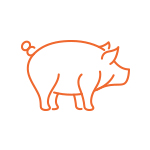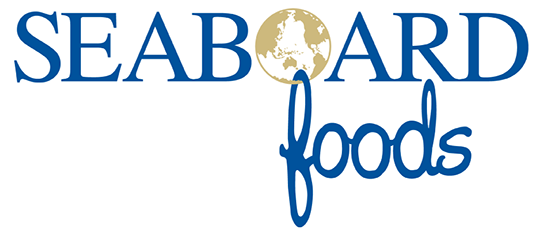Antibiotic Use at Seaboard Foods
We are dedicated to raising healthy pigs, so we can deliver wholesome pork to our families and yours. Our veterinary team develops a total care plan designed to keep our pigs healthy. This plan includes keeping our barns clean, feeding our pigs a balanced, nutritious diet and immunizing our pigs, as well as the selective use of antibiotics.

Antibiotic Use at Seaboard Foods: The Basics
At Seaboard Foods, we use antibiotics for three main reasons:
- To treat a sick animal when diagnosed
- To control the spread of disease among pigs housed together if several pigs have shown signs of illness
- To prevent the spread of disease in our herds where there may have been exposure or disease is likely to occur
Our Commitment to Responsible Antibiotic Use
We go the extra mile to ensure the safe and judicious use of antibiotics on our farms.
- Preserving the efficacy of antibiotics is incredibly important to us, so we limit our use of antibiotics that are used in both human and animal health (medically important antibiotics).
- We do not use medically important antibiotics for human health to promote growth or for feed efficiency in our animals.
- We maintain detailed records of all antibiotics used on our farms and adhere to (and often exceed) the mandated withdrawal times.
- We closely follow guidance to ensure proper dosages and judicious use at specific times in the animal’s life.
Keeping Our Pigs Healthy Is a Team Effort
Everyone at Seaboard Foods has a role to play in ensuring the health and safety of our pigs, from our veterinarians and the many farm employees who work daily with our pigs, to the folks who operate our feed facilities and those who process our pork. Because we are connected across every aspect of raising our pigs and making our pork, we are constantly sharing knowledge so we are doing better by knowing better, every step of the way.
FAQs
Why does Seaboard Foods use antibiotics?
At Seaboard Foods, we are committed to raising healthy pigs to produce safe, delicious pork. Our veterinary team develops and oversees a comprehensive total care plan, which includes proper housing, keeping our barns clean, feeding our pigs a balanced, nutritious diet and administering vaccinations – all designed to keep our pigs as healthy as possible. Our goal is to keep our pigs healthy and minimize the use of antibiotics, but there are occasions when we need to use antibiotics to control the spread of disease in our herds or to treat a disease when it is diagnosed. Without this treatment program, the pigs may suffer and the pork products from those animals may not meet quality expectations.
When does Seaboard Foods use antibiotics?
At Seaboard Foods, raising healthy pigs so we can deliver safe pork to our customers is the foundation of all that we do. We use antibiotics when it is the right decision to protect the health of our pigs. At Seaboard Foods, we use antibiotics to treat an individual sick pig, to control the spread of disease among pigs in a barn together if one or more has shown signs of illness, or to prevent the spread of disease where there may have been exposure or disease is likely to occur.
Does Seaboard Foods treat pigs with antibiotics pre-emptively, even when they are not sick? If so, why?
Treating animals is different from treating humans. In humans, doctors treat the individual. In farm animals, veterinarians tend to treat the herd. On our farms, it is important that we prevent and control the spread of disease to keep our pigs safe and healthy and prevent animal suffering. We have found that it is often more humane and efficacious to prevent illness than to treat a sick animal that may later infect other animals.
How can you tell a pig needs antibiotic treatment?
Our team responsible for animal care walks through our barns each day and is trained to spot early signs that a pig is sick. Droopy ears, irregular breathing or even something as subtle as not being as curious as usual or lying in a spot where they don’t typically rest, tell us a pig might be ill. When we spot symptoms, our animal care team immediately begins treatment, which can include the use of antibiotics, with that particular pig. As needed, diagnostic testing is utilized to ensure we are selecting the appropriate antibiotic needed to treat the disease that is present. The quicker we can identify and bring a pig back to health, the better for that pig and the entire herd.
How are antibiotics administered to animals?
Antibiotics can be administered via feed, water or injection. We rely on all of these methods, depending on the number of pigs being treated, their age, the type of antibiotic and other factors. When treating pigs via feed, we make the feed a different color than the non-medicated feed, so it is easy to tell when a group of pigs is being treated and when the treatment has stopped.
Is pork from pigs raised using antibiotics safe?
Yes. The Food and Drug Administration oversees a stringent approval process for all veterinary medicines and antibiotics. In fact, the testing for antibiotics used in animals is the same as that for antibiotics used in humans, with the added requirement that they must be tested to ensure meat and milk from the treated animal is safe for human consumption.
What safeguards are in place to ensure antibiotic residues do not end up in pork products?
Seaboard Foods sets requirements for raising and caring for the pigs, making the feed and processing the pork. Whenever any medication is used on the farms, including antibiotics, it is immediately recorded. Knowing what antibiotic was used, when and for how long lets the pig farmers know exactly how long is required to wait before the treated pig can go to market. This is called a withdrawal period and the FDA mandates the wait time. At Seaboard Foods, we require adhering to – and often exceeding – the mandated wait time.
Are antibiotics used on the farm the same as those used in human health?
There are many different types of antibiotics. Some are used in both people and animals. Some are used primarily in animals and are not considered medically important to people – meaning they are not the antibiotics needed to treat the most challenging illnesses in people. At Seaboard Foods, we strive to minimize our use of all antibiotics, particularly medically important antibiotics, and are supportive of FDA’s policy to phase out the use of medically important antibiotics to promote growth and phase in more veterinary oversight.
Does Seaboard Foods use antibiotics for growth promotion?
At Seaboard Foods, we are committed to the responsible, judicious use of antibiotics, and are always looking for ways to preserve the effectiveness of antibiotics. We are supportive of FDA’s policy (Guidance 209) to phase out the use of medically important antibiotics in human medicine to promote growth and improve feed efficiency.
Does Seaboard Foods produce any “no antibiotics added” pork products?
Seaboard Foods does not produce pork products labeled “raised without antibiotics.” We are committed to caring for our pigs in a responsible, safe manner, and sometimes the use of antibiotics is the right choice for the health of the pig or herd. Even niche pig farmers who raise pigs for the “raised without antibiotics” label treat sick pigs with antibiotics when necessary because it is the humane thing to do; they simply separate those pigs out and do not market them for the “raised without antibiotics” label.
Additional Industry Resources
